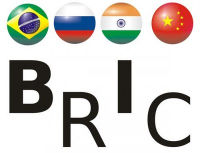Debt levels of BRIC governments -- Brazil, Russia, India and China -- are likely to remain more or less unchanged during the next five years, while it will rise "dramatically" in the US, Japan, and the UK, says a report.
 According to a report by DB Research, a part of the German banking major Deutsche Bank, over the next five years government debt is set to decline moderately in the BRICs, while it will rise dramatically in the G4, with the exception of Germany.
According to a report by DB Research, a part of the German banking major Deutsche Bank, over the next five years government debt is set to decline moderately in the BRICs, while it will rise dramatically in the G4, with the exception of Germany.
A combination of lower fiscal deficits, faster economic growth and higher inflation will ensure debt sustainability for the BRIC nations, it said.
Giving further details, the report said the gross general government debt in Brazil and India amounts to a sizeable 67 per cent and 75 per cent of GDP, respectively, while in China and Russia it stands at a very low 20 per cent and 10 per cent of GDP, respectively.
Another notable point is that the BRIC government debt is almost exclusively held by residents, barring only Brazil, where foreigners own a little more than 10 per cent of total government debt.
In sharp contrast, in Germany and the US, foreigners hold 50 per cent of government debt, while in the UK the figure stood around 30
per cent.
However, since all BRIC economies have been experiencing strong real credit growth over the past two years, there are concerns about a future rise in non-performing loans and the potential need for the government to extend financial support to the banking sector.
Banks lending to the private sector amounts to 50 per cent of GDP in Brazil, India and Russia and a very considerable 135 per cent of GDP in China.
Besides, government-owned banks account for 50 per cent of total banking sector assets in China, 40 per cent in both Brazil and Russia and 70 per cent in India.
Since government owned banks account for a significant portion of the total banking sector assets in the BRIC nations, the risk of a potential liability is also greater.
However, even if the BRIC public sectors are forced to take on contingent liabilities, they would still be in better shape, than the G4, the report said.
"Financially and politically, the BRICs will benefit from far greater fiscal flexibility than the advanced economies over the next decade and beyond, off-balance sheet liabilities notwithstanding," the report said.
© Copyright 2024 PTI. All rights reserved. Republication or redistribution of PTI content, including by framing or similar means, is expressly prohibited without the prior written consent.

 According to a report by DB Research, a part of the German banking major Deutsche Bank, over the next five years government debt is set to decline moderately in the BRICs, while it will rise dramatically in the G4, with the exception of Germany.
According to a report by DB Research, a part of the German banking major Deutsche Bank, over the next five years government debt is set to decline moderately in the BRICs, while it will rise dramatically in the G4, with the exception of Germany.